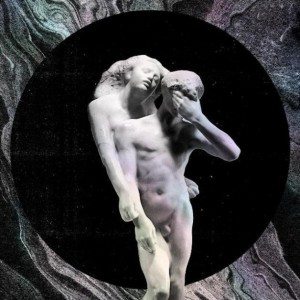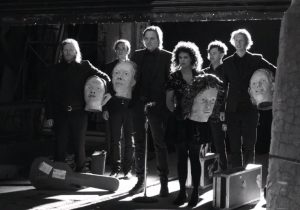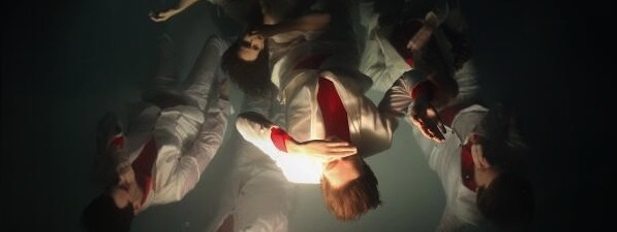Reflektor
 Arcade Fire are too cool for this shit. They’re too cool for a star rating, too cool for conventional genres, so cool that they’re uncool, which only reinforces how cool they actually are. You have to wear vintage clothes and have thick-rimmed glasses just to be qualified enough to listen to them.
Arcade Fire are too cool for this shit. They’re too cool for a star rating, too cool for conventional genres, so cool that they’re uncool, which only reinforces how cool they actually are. You have to wear vintage clothes and have thick-rimmed glasses just to be qualified enough to listen to them.
And now they’ve made one of the most eagerly-anticipated albums of the year, thanks to their carefully-constructed guerrilla PR: subtly placed graffiti in Williamsburg and on Brick Lane, before posting the entire album free on YouTube for a single day. The band’s fourth studio export was shrouded in such a level of mystery and hype that the entire hipster population threatened to burst into little clouds of ironic dust. And for good reason.
Reflektor sounds like every branch of music ever produced before, all compressed into a curiously compelling, all-encompassing sound. It’s a carnival in your ears, where Haitian Rara drum music meets disco for lunch, before bumping into some grunge rock and high-fiving ’80s synth-pop on the way. After too many listens, all music now sounds like that of Arcade Fire, which may well be a mild case of Reflektor-fever – professional help will be sought. This is, of course, a concept album, guided by the gentle hands of James Murphy (of LCD Soundsystem fame) to startling freshness.
This music bears the instantly unmistakable stamp of Arcade Fire at the same time as sounding nothing like what we’ve ever heard from them before. Their archetypal sound remains, with definite traces of their three previous albums present and correct, but now there are even more elements at play: it has all been building towards these two discs. Reflektor offers an ode to rhythm which hits you on a primordial level: it is entirely impossible to tune in without an involuntarily gyration of the hips occurring in the most inappropriate of places (for example, on the U1 at 9am).
Reflektor sounds like the last dirge of all music; venerating everything that came before the present day. Songs never become simply background music: they are works to sit down with and appreciate in full.
Reflektor sounds like the last dirge of all music; venerating everything that came before the present day. Trumpets blare the end of the world as we know it, while the lyrics melt your insides as the group rally to sing about looking for Hell within. The final six minutes of album closer ‘Supersymmetry’ resonate with a glimpse of a minimalist future world; wibbly-wobbly timey-wimey soundbites melt your heartbeat alongside layers of multi-textured synthesisers and silent echoes, congealing into an experience which feels akin to taking a haunting bath in luminescent blue water.
Epic seven-minute love songs build on super-catchy riffs, which each swell to cacophonies of music which are almost edible. They aren’t ever background music: they are works to sit down with and appreciate in full. Like great works of literature, these songs warrant  returning to time and time again, rewarding multiple listens. There is not one skippable track present: a surefire mark of a brilliant album.
returning to time and time again, rewarding multiple listens. There is not one skippable track present: a surefire mark of a brilliant album.
And, of course, David Bowie happens. And thus, the world as we once knew it implodes. The title track is a song so great that the king of disco himself threatened to steal it if they didn’t collaborate. Reflektor shivers with considerably more poignancy than, say, Justin Timberlake’s ‘Mirrors’. Both are about reflective objects, of course, but this means more than mere vanity. “Do you like rock n roll music? ’cos I don’t know if I doooooo” Win Butler sighs exasperatedly in your ears, such meta-musing underpinning the ways in which Arcade Fire continually toy with expectations.
More than just music, their songs are lyrics; berating the porn industry, screaming about the pointlessness of modernity, sighing about the wastes of contemporary culture, the ersatz nature of iPhone communication; how all the screens of modern technology are just reflektors. Arcade Fire amount to every literature student’s dream: their lyrics are brilliant for dropping into your ultra-pretentious essay on the postmodern condition. They have no qualms with mingling Kierkegaard and ancient Greek myth. The album tells the saddest story ever told, of Orpheus and Eurydice (depicted in the statue on the album cover): lovers, separated by death. He (Orpheus) is given a chance to save her (Eurydice) but makes the tragic mistake of turning to look at her before they return from the underworld, thus losing her forever.
Ultimately, Reflektor achieves the remarkable, realising the unbelievable potential of disco in the most unexpected of places. Arcade Fire are not rockstars: they are pure art.
Similar To: Arcade Fire
MP3: [the whole thing]

Comments (1)